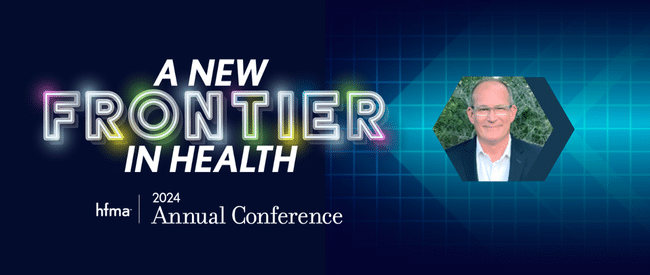It was great being back at the 2024 HFMA Annual Conference, meeting up with former colleagues, seeing clients and forging new connections. The 3,500 attendees brought a tangible sense of urgency and energy for collaborating, innovating and leveraging promising technologies to address healthcare’s toughest financial, care, workforce, patient experience, regulatory and other issues.
To open the conference, HFMA CEO C. Ann Jordan didn’t pull any punches when setting out the challenges, according to reporting by the organization’s senior editor Nick Hut: “The U.S. healthcare industry faces perils,” Jordan said. “We can’t ignore it. Most of us here today know that the U.S. spends far more per capita on healthcare than any other developed country, and yet it lags in life expectancy and other vital outcomes. We are confronted with a challenge to optimize care delivery practices, prioritize prevention and purge administrative waste from within the system to improve affordability.”
At the same time, Jordan urged attendees to “fear not” because of all the opportunities to harness AI and other technologies to drive greater cost effectiveness, revenue cycle efficiency, focus on prevention and wellness, value-based care, health equity and access and other important improvements.
I have to underscore this outlook because the sessions I attended and conversations I had were very much focused on insights, lessons and solutions–for new ways of delivering care, improving provider finances, boosting patient experience and more. Some key takeaways:
- Partnerships, with the right collaborators, are key to accelerating and achieving tech-driven advancements.
- When in doubt, focus on your mission. Competitors target what you don’t do well. Said another way, don’t try to be all things to all people.
- Humanizing healthcare, making it more outwardly focused and patient-centered, is imperative.
- Instead of dehumanizing healthcare, technology can help further humanize it by making it more personalized, real-time, and easy to find comprehensive records and other information.
- Human-centered design in patient billing and payments, including the look and content of the bill itself, accurate price estimates and the steps for receiving and making payments, is essential for increasing patient payments.
- Like other digital and cloud technologies, AI offers tremendous promise. But it should be used to empower people, not replace them. That’s why establishing a robust governance approach to AI is so important.
In addition to the takeaways above, there’s also ongoing concern about the regulatory environment.
- AccessOne’s KaLynn Gates provided a thorough overview of federal and state regulatory trends and activity that are currently impacting or will have an impact on the revenue cycle. Expanded financial assistance requirements and more prescriptive payment plan requirements that vary by state ,and of most concern, the CFPB’s proposal to eliminate all credit reporting on medical debt.
- Collection industry experts including Jack Brown III of Gulf Coast Revenue Cycle Management and Tim Haag of State Collection Service provided more details of the CFPB’s proposal and say that this credit reporting change could add tens of billions of dollars in cost to our nation’s healthcare system.
Challenges posed by the regulatory environment, our economy and the complexity of our healthcare system call for continued collaboration and innovation among all stakeholders. Like many other HFMA attendees, we at Nordis are focused on working with our clients and our partners to create better solutions for the industry. To that end we pride ourselves in providing innovative print and mail services and cloud CCM software solutions that improve patient financial communications and payments. Please contact us to learn more.






